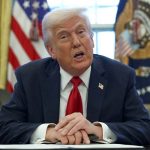US President Donald Trump’s plan to impose tariffs on imported vehicles is sending shockwaves far beyond the Detroit auto industry.
The policy is adding to investment risk and is set to hit global supply chains connected to the vast automotive sector, with potentially significant consequences for emerging economies like Thailand.
Thailand in the crosshairs: a vulnerable auto hub
“South Korea is most exposed, followed by Japan. Within ASEAN, Thailand — a regional manufacturing hub — is most vulnerable,” Nomura economists wrote in a note on March 27 about the auto tariff risks in Asia.
Thailand, a major player in Southeast Asia’s automotive industry, is bracing for impact.
The country’s Finance Minister, Pichai Chunhavajira, acknowledged that the auto part exports will be affected by the tariffs.
While Pichai did not quantify the precise impact of Trump’s impending levies, the implications are significant.
Thailand is the largest car production hub in Southeast Asia, boasting an extensive network of factories that supply parts and raw materials to global players ranging from carmakers to tire manufacturers.
The benchmark SET Index in Thailand dropped 1% on Friday to a one-week low.
The index is about 16% lower year to date as Trump’s trade war injects more uncertainties into a market already battered by corporate scandals, weak economic growth, poor corporate earnings, and political instability.
Although Thailand’s auto shipments account for just 4.3% of its exports to the US, weak global demand could depress shipments of auto parts elsewhere.
The vulnerabilities in Thailand underscore the existence of investor landmines worldwide as investors move some investments away from the US’s volatile markets.
Nomura analysts wrote, “These effects may take some time to materialize but, in our view, pose a clear medium-term threat to one of Thailand’s leading industries.”
The 25% tariff on all imported finished vehicles is slated to take effect on April 3.
A 25% tariff on auto parts is slated to take effect no later than May 3.
Trump’s executive order did not name China, but it said the pandemic and its impact on global supply chains has undermined the US’s ability to maintain a resilient domestic industrial base.
It also said that foreign auto industries “propelled by unfair subsidies and aggressive industrial policies, have grown substantially”.
The tariff announcement sent domestic and foreign auto stocks tumbling.
In Asia, Japan’s and South Korea’s car makers are expected to be in the direct line of fire, with shares of auto giants Toyota and Hyundai posting sharp losses since the executive order was signed.
In Europe, shares of automakers also fell, with Germany’s Volkswagen and BMW down 4% since Trump signed the executive order.
The post Beyond car stocks: Donald Trump’s tariffs threaten global auto supply chains appeared first on Invezz





